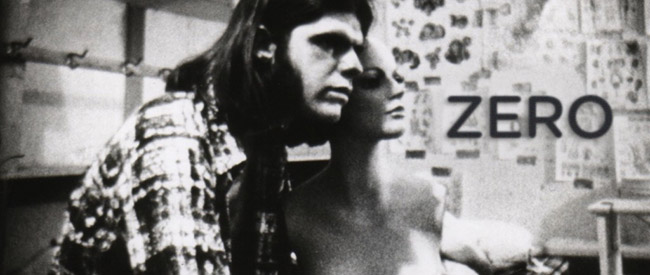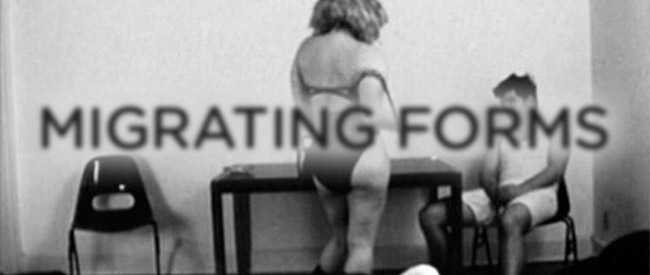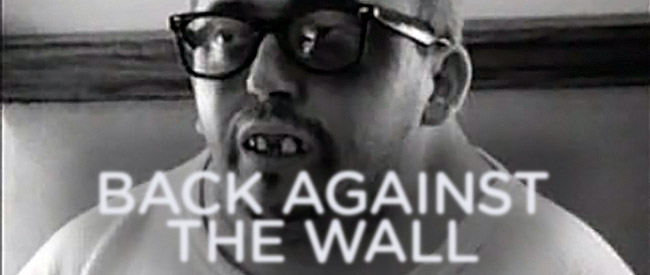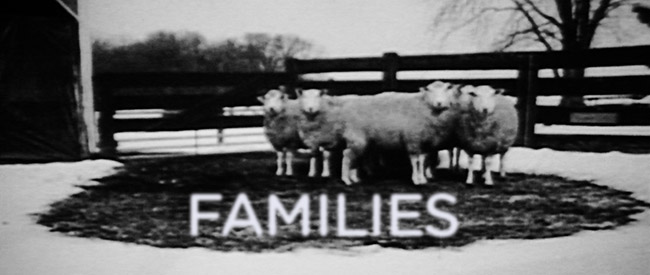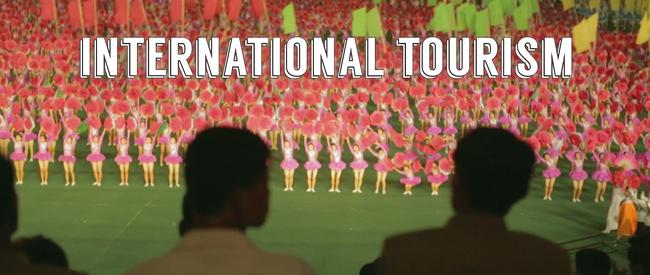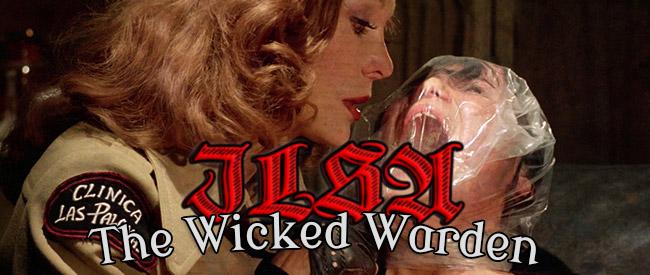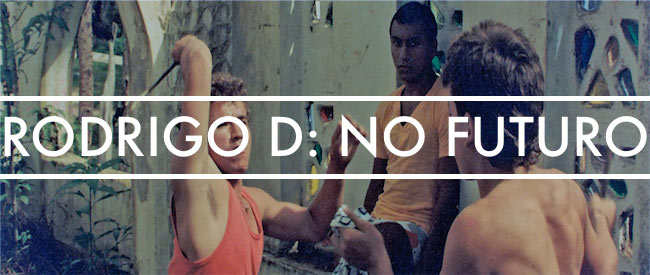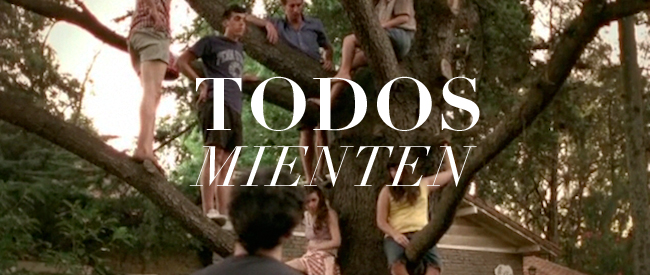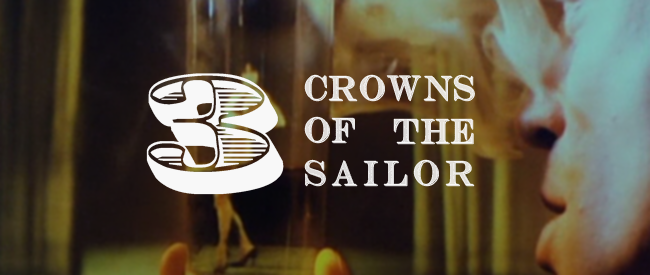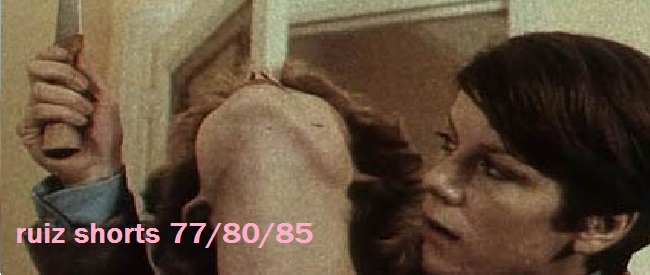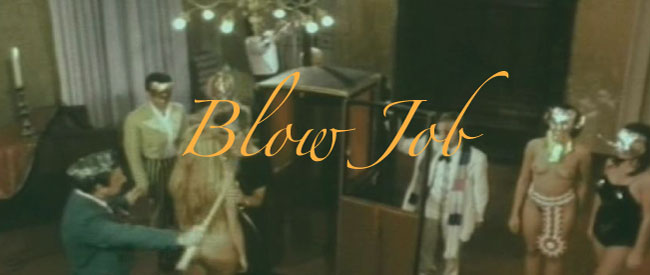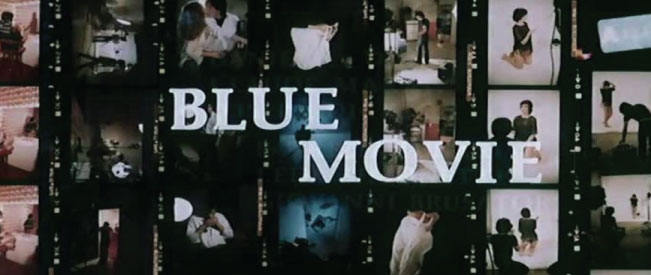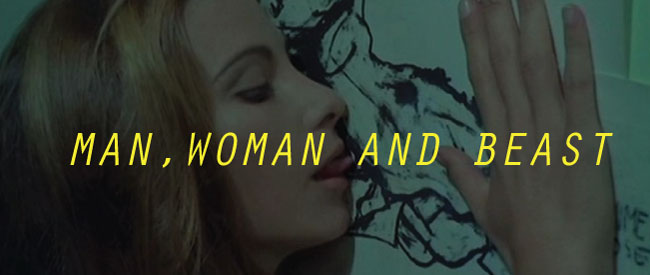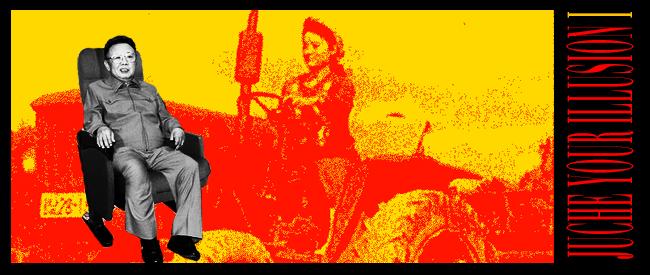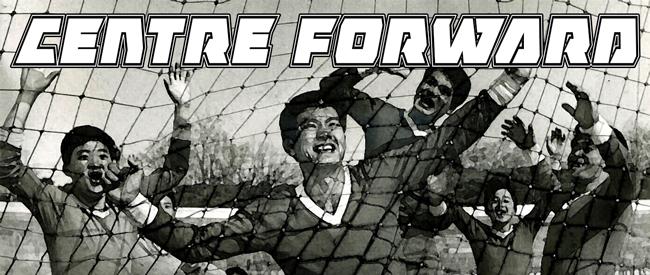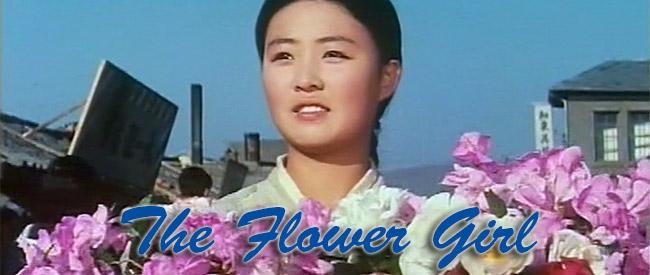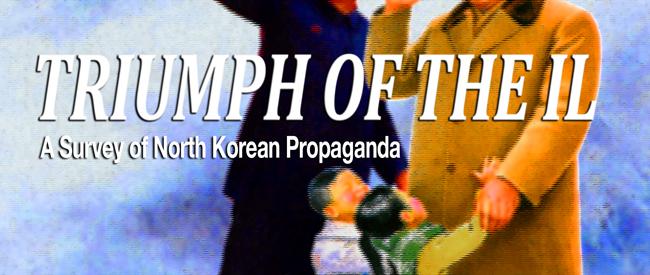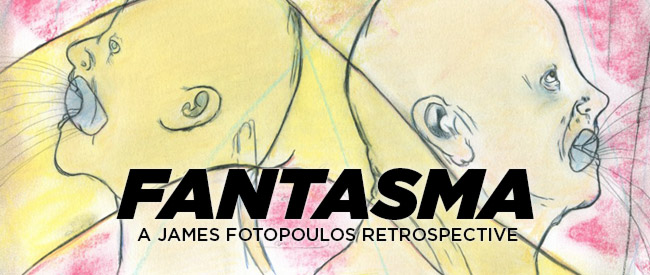
ONE WEEK ONLY! APRIL 9 – 15 – Filmmaker in attendance at most screenings!
This April, Spectacle is pleased to present the first retrospective of film and video artist James Fotopoulos in over a decade—an eternity relative the supernatural profligacy of Fotopoulos’s label-defying output. Perhaps no other moviemaker so categorically denies compartmentalization, falsifying dichotomies of underground and art film, narrative and abstraction, and black box and white cube, while unabashedly appropriating, celebrating, and upturning the conventions of the horror, sci-fi, hardboiled, and melodramatic genres.
For this retrospective, which only scratches the surface of Fotopoulos’s filmography, we focus primarily on narrative work, including all five of his feature-length 16mm films, four hybrid-narrative videos, and the four-part back-and-forth 16mm/video feature CHRISTABEL, included in the 2004 Whitney Biennial yet unseen in its original formats since its 2001 premiere. Peppered throughout in night-at-the-movies style we’ll also showcase various shorts programmed alongside features and other bits of audiovisual mood-enhancing odds-and-ends.
Organized in close collaboration with the artist, the series features personal film prints and brand-new video transfers made directly from the masters. Skewing toward early works, it comes on the heels of a solo show at Microscope Gallery, which included the premieres of recent works THE GIVEN (2015) and THERE (2014). Along with DIGNITY (2012), a feature that premiered at Spectacle last year, they represent a sort of full-circle return to the formal approaches of the early films in this retrospective.
This retrospective is also preceded by a selection of feature-length abstract works presented at Millennium Film Workshop on April 2. Details on show here.
Special thanks to The Film-Makers’ Cooperative and Rebecca Cleman.
ZERO
Dir. James Fotopoulos, 1997
USA, 142 min. 16mm.
Screening on 16mm for the first time in New York since its premiere!
THURSDAY, APRIL 9 – 8:00 PM – Filmmaker in attendance!
Made when the director was still in his teens, ZERO is a highly disturbing (and deadpan hilarious) portrait of a mentally unhinged loser biding his time shitting, unravelling, ranting, and sharing moments of tenderness with a mannequin head, his only friend and lover. Placed throughout are highly affecting and evocative sequences of toned, hand-painted imagery and highly unconventional film processing representing death, disease, decay, and sex, and pastoral interludes that suggest a state of mental tranquility that’s already too far gone.
The director describes ZERO as a “a two-and-a-half-hour endurance test,” but for better or worse, that might be an overstatement: ZERO is as hideous as it is riveting in its rhythm and pacing. Yet it is by no stretch appropriate for the easily offended.
ZERO has been essentially unseen—and not shown at all on 16mm—in New York since it’s sparsely attended premiere. This is an unmissable chance to catch one of Fotopoulos’s most important yet rarely seen films.
MIGRATING FORMS
Dir. James Fotopoulos, 1999
USA, 80 min. 16mm.
Screening on 16mm!
FRIDAY, APRIL 10 – 7:30 PM – Filmmaker in attendance!
FRIDAY, APRIL 10 – MIDNIGHT – Filmmaker in attendance!
WEDNESDAY, APRIL 15 – 10:00 PM
“A kind of stripped down ERASERHEAD … MIGRATING FORMS has a formal purity and obsessive power that’s all too rare these days.” –Amy Taubin, Village Voice
A movie about a man, a woman, and a room in which they habitually engage in deeply uneasy coitus—sex both rote and fever-pitched, which seems somehow motivated by the paradoxically repulsive and magnetic draw of a phallic tumor extruding from the woman’s back. It’s a pulverizingly minimalist masterpiece of finely-tuned anxiety.
MIGRATING FORMS justly earns comparison to David Cronenberg for its psychosomatic representation of disease and body horror, as well as the uncanniness of the banality in the work of David Lynch. But, particularly in light of Fotopoulos’ subsequent profusion of work, one might also draw comparisons to ceaselessly prolific trash-row auteurs like Joseph Sarno and Andy Milligan, in comparison to whom the arthouse, experimental cinema, and gallery is Fotopoulos’s 42nd Street. For some, the greatest virtue of sexploitation is its hypnotic, drone-like banality, which is here consciously perverted into avant-garde extremes. It’s often said that as the exploitation film dried up its techniques of sensationalism and salesmanship were assimilated by Hollywood; it’s less often noted that, removed from any established market—this is the tail-end of the decade that saw the sanitization of Times Square—the weirdness of marginal cinema truly broods in uncompromising movies like MIGRATING FORMS.
MIGRATING FORMS literally redefined the underground. It was a sensation at its New York premiere, with Amy Taubin writing that “[MIGRATING FORMS] alone gives the Underground Film Festival a reason for being.” The statement was prophetic: in 2008 the name of the festival was changed accordingly to reflect the kind of protean, hybrid, relentlessly unclassifiable cinema Fotopoulos had ushered in.
BACK AGAINST THE WALL
Dir. James Fotopoulos, 2000
USA, 94 min. 16mm.
Screening on 16mm!
FRIDAY, APRIL 10 – 10:00 PM – Filmmaker in attendance!
WEDNESDAY, APRIL 15 – 7:30 PM
“The term ‘noir’ only begins to describe the malignant atmosphere that seeps like a poison gas through James Fotopoulos’s grimy, clanging film.” –Stephen Holden, The New York Times
Back Against the Wall presents an atmosphere of ever-increasing doom, as a woman named June seems to engage in a grotesque personal experiment that involves hitching herself to defective men. Each of the film’s three chapters is devoted to one of them; Levey is a speed-reading rage freak prone to seizures and melancholy, pornographer or pimp Vince is friendlier but his professional contacts keep knocking out his teeth, and finally we encounter Ed, a truly singular creation who is stricken with a terminal disease and spends long moments whispering nonsense. The backdrop is a menacing and featureless Middle America with its shitty drugs, prefab motel rooms and mediocre towns. A generic mud-stained farmhouse is the depressing setting for a porno shoot where June and other women dress up as a sexy cowgirl, a sexy cow and a sexy child holding a teddy bear, respectively.
The film’s sorrows are particular and finely tuned, focusing on the impending stage of all sorts of disasters we can only imagine, with incredible grace and humor in long silences, grim non sequiturs and a surreal air of decay.
CHRISTABEL
Dir. James Fotopoulos, 2001
USA, 74 min. 16mm/video.
Screening for the first time since its premiere in its original alternating 16mm/video back-and-forth format!
SATURDAY, APRIL 11 – 7:30 PM – Filmmaker in attendance!
“Christabel is an abstract interpretation of Samuel Taylor Coleridge’s unfinished Gothic poem about female possession. Adhering to the poem’s structure the film is presented in four parts – Two digital video half hour segments and then two short 16mm conclusions. The contemporary relevance of the poem’s symbols and themes is underlined using performance combined with heavy image and sound layering.” —JF
FAMILIES
Dir. James Fotopoulos, 2002
USA, 97 min. 16mm.
Screening on 16mm!
SUNDAY, APRIL 12 – 7:30 PM – Filmmaker in attendance!
“The experience of this rich film is a completely unique mix of alienation and empathy, horror and bemusement—it should go in the time capsule, as a token of life on earth at the turn of the millennium.” —Rebecca Cleman, Screen Slate
A hybrid film that intentionally clashes techniques and syntaxes, FAMILIES is a series docufictional vignettes in a rural industrial town as portrayed through Fotopoulous’ singular eye.
“Life in a rural industrial town: a teenage boy, his family, friends and failed attempt at love are investigated through stark black-and-white photography and static long takes. Filmed in a fusion of authentic and staged documentation, with robotic performances by actors and non-actors, the piece meditates on the mundane existence of human and animal life.” —JF
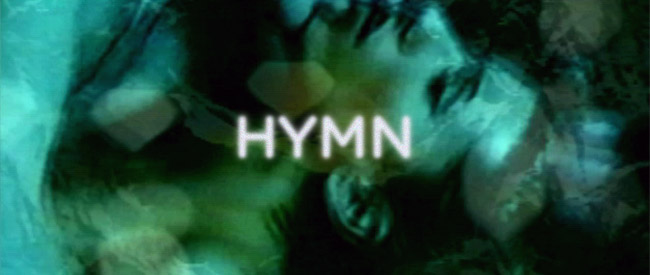
HYMN
Dir. James Fotopoulos, 2002
USA, 90 min. Video.
MONDAY, APRIL 13 – 7:30 PM – Filmmaker in attendance!
“A digital poem of the flesh unfolding in near mathematical structural precision.” HYMN borders upon abstraction, voyeurism, and pornography, presenting digitally processed video of copulation interpolated with flicker, painting, sound, and sculpture. Bathed in teal hues and uncanny glimmers, HYMN is one of Fotopoulos’s most hypnotic and seductive works. It also speaks latently to pre-broadband Internet sex culture, based as it is upon footage commissioned from Fotopoulos by a teenage couple who had discovered his work online and invited him to film them as part of a tape-trading ring.
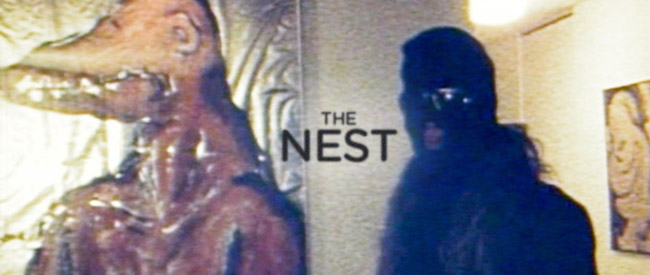
THE NEST
Dir. James Fotopoulos, 2003
USA, 78 min. 16mm.
Screening on 16mm!
SUNDAY, APRIL 12 – 10:00 PM – Filmmaker in attendance!
“THE NEST suggests that other great suburban tract of the ‘80s, Don DeLillo’s WHITE NOISE, but rather than being about a toxic airborne event, THE NEST simply is one.” —Spencer Parsons, Cinematexas
“Filmed in saturated colors on out-of-date film stocks with an aggressive soundtrack, the story of The Nest is told – The marriage of two young professionals unravels after an unnamed accident physically and emotional traumatizes the wife. Government agents, shadowy investigators and transgender beings appear, trying to solve the nervous-breakdown-mystery of secret alien forces that chose the couple as their target. In-camera tricks, drawings, derelict optical printing, miniatures, puppets and prosthetic makeup effects convey the dual collapse of the protagonists’ lives and the film structure as one unified entity.” —JF
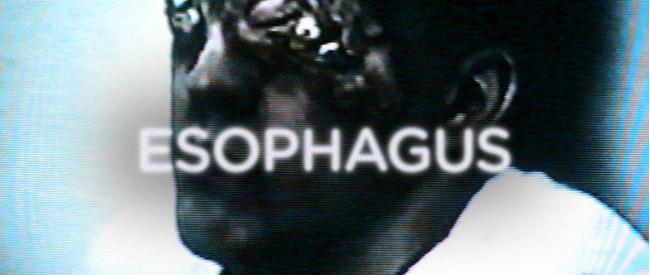
ESOPHAGUS
Dir. James Fotopoulos, 2004
USA, 70 min. Video.
MONDAY, APRIL 13 – 10:00 PM – Filmmaker in attendance!
“The origins of the universe told through the lens of an experimental film and video sci-fi horror-show fusion: Alien women trapped in a colorfully hand-scratched film-textured hotel room, genetically mutated men slowly driven mad in a white digital prison, the high contrast landscapes of Mars, and a futuristic tribe of a giant, an elf and a witch in their decaying suicide-home.” —JF
On the bleeding edge of narrative, abstraction, and pure experimentation, ESOPHAGUS is a hypnotic multi-part film/video hybrid. In the beginning, rhythmic, undulating pulses of color give way to scratched images of lovemaking. In amateurish digital video, a group of imprisoned men are driven mad by repetitious digital computer voices. The computer vocals continue in a profane, sing-songy back-and-forth over images of a dark elf and witch before the pair depart for Mars, bringing the narrative full circle into a brooding digital soup.

THE ANT HILL
Dir. James Fotopoulos, 2004
USA, 60 min. Video.
SATURDAY, APRIL 11 – 10:00 PM – Filmmaker in attendance!
TUESDAY, APRIL 14 – 10:00 PM
“At the center of this video, one of Chicagoan James Fotopoulos’s strongest works, is a cult founded by a man who says he’s obeying instructions from a forest apparition. The sparse narrative follows the usual cult arc—the leader requires obedience, the followers perform revolting tasks (most, thankfully, offscreen), and two plan an escape. But this is less realistic storytelling than contemplative satire—the leader wears a hokey beard and crown, and the actors speak like automatons. In a prologue the leader writhes nude, almost epileptic, alongside a woman, suggesting Fotopoulos’s key theme: our bodies, and existence itself, are the real traps.” —Fred Camper, The Chicago Reader
“When a cult leader’s vision of the end of the world is not fulfilled he beings the systematic humiliation and destruction of his followers. The derelict play unfolds on a barren stage with bursts of animation, field recordings of sound, alien creatures and dime store costumes – a high school production aesthetic of the most extreme nature.” —JF
THE SKY SONG
Dir. James Fotopoulos, 2007
USA, 127 min. Video.
TUESDAY, APRIL 14 – 7:30 PM
Remember your suspicion that the Microsoft Paperclip and your 56k modem were agents of Interzone working in tandem to surveil our collective dreams? In 2007, Fotopoulos unearthed one of their communiques and refashioned it as THE SKY SONG, an unsettling Western melodrama submerged in a seething vat of pixelated noise.
According to Fotopoulos, the film concerns a “quest for revenge” that takes a man “on a journey to reconcile the horrors of his past — illness, murder, lost love and war.” Ostensibly accurate, that synopsis does little to prepare viewers for the phantasmagoric succession of video effects or the comically flatlined dialogue that orbit some obscure truths about our fixation with the old west. A wry digital primitive, Fotopoulos costumes his actors in K-Mart halloween kitsch and surrounds them with graphics sketched in MS Paint. The resulting work lashes against your nerves before summoning sounds and images of sublime surreality.
Stripped of all majesty, this is where the Western belongs in the 21st century: reduced, exploded and crudely refabricated.

